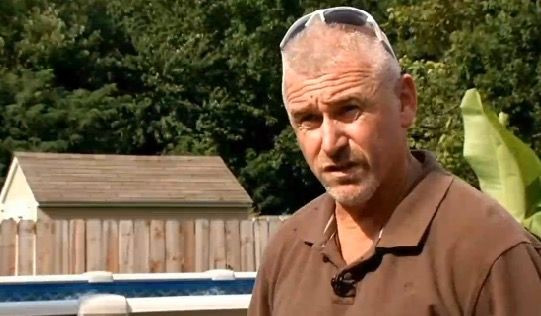William Merideth was arrested and charged with criminal mischief and wanton endangerment Sunday evening after shooting down an $1800 drone he claims was spying on his teenage daughter sunbathing in Hillview, KY.
“My daughter comes in and says, ‘Dad, there’s a drone out here flying,’ ” William H. Merideth told WDRB , Tuesday.
“I came out and it was down by the neighbor’s house, about 10 feet off the ground, looking under their canopy … in their back yard," Merideth said. "I went and got my shotgun and I said, ‘I’m not going to do anything unless it’s directly over my property … Within a minute or so, here it came … hovering over top of my property, and I shot it out of the sky."
Soon after Merideth shot the drone, four men showed up at his door “looking for a fight” and asked Merideth if he was “the son of a bitch that shot my drone.”

Merideth, with a 10mm Glock holstered on his hip, confirmed he had shot down the drone and told his accuser "if you cross that sidewalk onto my property, there’s going to be another shooting."
The men left, but soon after the police arrived and arrested Merideth. Though Ars Technica reports that law enforcement officials allegedly told Merideth they agreed with his actions, he was being charged due to an ordinance against discharging firearms in the city.
Though Merideth was disappointed in the law enforcement’s response to the situation, he feels “confident” his charges will be reduced or dismissed entirely.
"You know, when you’re in your own property, within a six-foot privacy fence, you have the expectation of privacy," he said. "We don't know if he was looking at the girls. We don’t know if he was looking for something to steal. If he had been moving and just kept moving, that would have been one thing, but when he comes directly over our heads, and just hovers there, I felt like I had the right … To me, it was the same as trespassing."
Merideth has sought legal aid in the case.
"We have a lawyer and there's a court date and then there's going to be a hearing," Merideth said.
“Our rights are being trampled daily," he added. "We need to have some laws in place to handle these kind of things."
Merideth’s case, along with other recent drone related shootings , serve as prime examples of a growing legal dilemma when technology and privacy collide. Adam Rouse of Chicago-Kent College's Institute for Law, Science and Technology, believes that Merideth has a good chance of having his charges dropped though the situation is murky at best.
“Before the advent of aircraft, property owners had the legal right to control their property from the depths of the earth to the bounds of heaven," Rouse told iDigitalTimes, including the airspace above their property.
But since the advent of commercial aircraft operating in US airspace those rights have been abrogated and rules have become fuzzy.
"The FAA regulates all commercial airspace -- everything over 500 feet where commercial flights fly – but it also regulates the operation of any aircraft (manned or unmanned) that operates in the United States,” Rouse explained to iDigitalTimes. “Drones have been approved for recreational use with some restrictions: They should always be flown within the line of site of the operator, flown below 400 feet, and flown in such a manner to not be a danger to life or property as well as flown in compliance with the rules of model aircraft organizations.”
Rouse cited the Academy of Model Aeronautics as one such organization, which requires that drones and other model aircraft not be flown over private property where the property owner has a reasonable expectation of privacy.
“It would seem that in this case the drone was not being operated properly,” said Rouse.
However, Merideth did violate a federal regulation . Therefore, even if the drone was trespassing, deadly force was likely ill-advised.
“The crux of the issue really comes down to a simple legal question: What use of force are we as a society willing to accept as reasonable to protect our property and families from misused drones?” said Rouse. “Would this situation of been different if the property owner had a jamming device that caused the drone to crash?”
Just this February, Oklahoma considered a bill that would have made it legal to shoot down a drone in a rural area when the drone was over private property.
While the FAA is still scrambling to design rules about drone use and control, they have yet to come up with a satisfactory set of regulations. Until they do, Rouse said, cases such as Merideth’s will continue to crop up.
“I think there is no easy answer for this situation,” he said. “The FAA has its hand full regulating commercial aircraft and commercial drones without having to field complaints about people using drones to spy. At the same time, however, laws have lagged behind regarding drone use. Without clear cut laws established regarding what to do when unwanted drones hover over private property with an HD camera attached, more of these shootings are going to take place. Or, people will get creative and find ways to take out drones without the use of guns.”







![[EG April 19] Best 'Stardew Valley' Mods That Will Change](https://d.player.one/en/full/226012/eg-april-19-best-stardew-valley-mods-that-will-change.png?w=380&h=275&f=955520b8313253ee3c39c791f6210f38)










